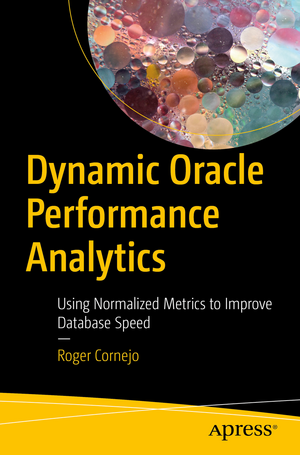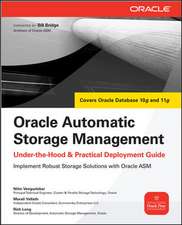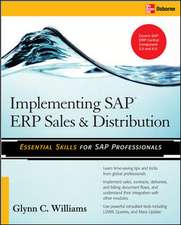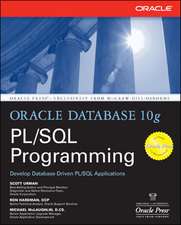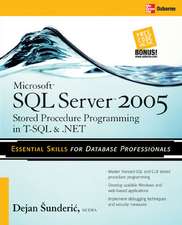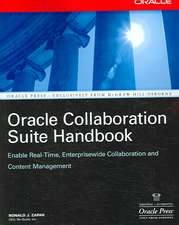Dynamic Oracle Performance Analytics: Using Normalized Metrics to Improve Database Speed
Autor Roger Cornejoen Limba Engleză Paperback – 7 dec 2018
Use an innovative approach that relies on big data and advanced analytical techniques to analyze and improve Oracle Database performance. The approach used in this book represents a step-change paradigm shift away from traditional methods. Instead of relying on a few hand-picked, favorite metrics, or wading through multiple specialized tables of information such as those found in an automatic workload repository (AWR) report, you will draw on all available data, applying big data methods and analytical techniques to help the performance tuner draw impactful, focused performance improvement conclusions.
This book briefly reviews past and present practices, along with available tools, to help you recognize areas where improvements can be made. The book then guides you through a step-by-step method that can be used to take advantage of all available metrics to identify problem areas and work toward improving them. The method presented simplifies the tuning process and solves the problem of metric overload.
You will learn how to: collect and normalize data, generate deltas that are useful in performing statistical analysis, create and use a taxonomy to enhance your understanding of problem performance areas in your database and its applications, and create a root cause analysis report that enables understanding of a specific performance problem and its likely solutions.
- Collect and prepare metrics for analysis from a wide array of sources
- Apply statistical techniques to select relevant metrics
- Create a taxonomy to provide additional insight into problem areas
- Provide a metrics-based root cause analysis regarding the performance issue
- Generate an actionable tuning plan prioritized according to problem areas
- Monitor performance using database-specific normal ranges
Who This Book Is For
Professional tuners: responsible for maintaining the efficient operation of large-scale databases who wish to focus on analysis, who want to expand their repertoire to include a big data methodology and use metrics without being overwhelmed, who desire to provide accurate root cause analysis and avoid the cyclical fix-test cycles that are inevitable when speculation is used
Preț: 259.41 lei
Preț vechi: 324.26 lei
-20% Nou
Puncte Express: 389
Preț estimativ în valută:
49.64€ • 51.51$ • 41.49£
49.64€ • 51.51$ • 41.49£
Carte disponibilă
Livrare economică 22 februarie-08 martie
Preluare comenzi: 021 569.72.76
Specificații
ISBN-13: 9781484241363
ISBN-10: 1484241363
Pagini: 200
Ilustrații: XXI, 224 p. 83 illus.
Dimensiuni: 155 x 235 mm
Greutate: 0.45 kg
Ediția:1st ed.
Editura: Apress
Colecția Apress
Locul publicării:Berkeley, CA, United States
ISBN-10: 1484241363
Pagini: 200
Ilustrații: XXI, 224 p. 83 illus.
Dimensiuni: 155 x 235 mm
Greutate: 0.45 kg
Ediția:1st ed.
Editura: Apress
Colecția Apress
Locul publicării:Berkeley, CA, United States
Cuprins
Part I. Performance Tuning Basics.- 1. Traditional Approaches.- Part II. The Dynamic Oracle Performance Analytics (DOPA) Process.- 2. Gathering Problem Information.- 3. Data Preparation.- 4. Statistical Analysis.- 5. Feature Selection.- 6. Taxonomy.- 7. Building the Model and Reporting.- Part III. Case Studies and Further Applications.- 8. Case Studies.- 9. Monitoring.- 10. Further Enhancements.
Notă biografică
Roger Cornejo has been an Oracle enthusiast since 1985 (versions 4-12c). He has experience on large enterprise-class Oracle applications, not only in performance troubleshooting and tuning, but also in systems architecture, information modeling, and software development/project management. For the past 10 years, his main focus has been database performance analysis and tuning, with much of his time spent exploring the complexities and usefulness of AWR* tuning data. He produces Oracle Database tuning results across 12c/11g/10g (and occasionally 9i) databases. He is a thought-leader in his field, and has been recognized for his expertise in tuning. He has presented at the past eight East Coast Oracle Conferences, as well as at COLLABORATE14 and COLLABORATE18, RMOUG16, and Hotsos 2017-2018.
Textul de pe ultima copertă
Use an innovative approach that relies on big data and advanced analytical techniques to analyze and improve Oracle Database performance. The approach in this book is a step-change away from traditional methods. Instead of relying on a few hand-picked, favorite metrics, or wading through multiple specialized tables of information such as those found in an automatic workload repository (AWR) report, you will draw on all available data, applying big data methods and analytical techniques to draw impactful, focused performance improvement conclusions.
This book reviews past and present practices, along with available tools, to help you pinpoint areas for improvement. The book then guides you through a step-by-step method that can be used to take advantage of all available metrics to identify problem areas and work toward improving them. The method presented simplifies the tuning process and solves the problem of metric overload.
You will learn how to: collect and normalize data, generate deltas that are useful in performing statistical analysis, create and use a taxonomy to enhance your understanding of problem performance areas in your database and its applications, and create a root cause analysis report that enables understanding of a specific performance problem and its likely solutions.
What You'll Learn:
- Collect and prepare metrics for analysis from a wide array of sources
- Apply statistical techniques to select relevant metrics
- Create a taxonomy to provide additional insight into problem areas
- Provide a metrics-based root cause analysis regarding the performance issue
- Generate an actionable tuning plan prioritized according to problem areas
- Monitor performance using database-specific normal ranges
Caracteristici
Presents a dynamic process that overcomes limitations of older tuning approaches The process in this book does not rely on AWR, and can be applied in any database The method draws from big data techniques to massively scale across thousands of available metrics
